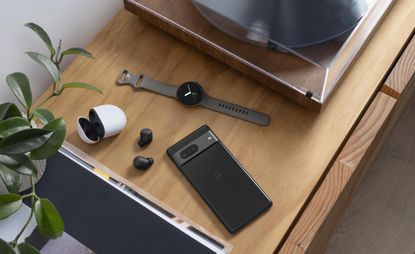Hands on with the latest Google Pixel products
- (opens in new tab)
- (opens in new tab)
- (opens in new tab)
- Sign up to our newsletter Newsletter

Google has launched its latest suite of Pixel products, including the company’s first foray into smartwatches, following its acquisition of Fitbit (opens in new tab) in November 2019 for over $2bn. Introduced in May 2022, Pixel Watch combines Fitbit’s well-established ecosystem of health metric tracking with Google’s own Wear OS platform. Pixel Watch is joined by the new Pixel 7 and Pixel 7 Pro, Google’s high-end Android smartphone series.

Google Pixel Watch
Taken as a suite, how do these new Pixels stack up? Arguably, only two tech companies can lay claim to completely immersive ecosystems. One of them is Amazon, and the other Google. Both are in the business of selling you stuff and shipping you stuff, working out exactly what stuff you need before you even realise it, and delivering laser-guided targeted ad data to help shape your decisions.

Google Pixel Watch
Although major competitors are in on the hustle to a certain extent, the likes of Apple, Microsoft, Samsung, Huawei, et al, don't have the same iron vice clamped around the relationship between device, data, and purchase.

One of Google’s tasteful colour palettes: coral
Google’s hardware chops are well established, and the Pixel phone and watch carry this legacy forwards. Both are available in an array of subtle, tasteful colour schemes, with four options for the Watch (a Matte Black case with Obsidian Active band, Polished Silver case with Charcoal Active band, Polished Silver case with Chalk Active band, and Champagne Gold case with Hazel Active band), all of which complement the Obsidian, Snow, and Hazel colour schemes of the Pixel 7 Pro (Obsidian, Snow and Lemongrass for the Pixel 7).

Another of Google’s tasteful colour palettes: dark neutral
Material choices are typically high quality. Pixel Watch has a classic circular Gorilla Glass face with a domed edge and toothed crown. The case is made from 80 per cent recycled stainless steel, and the standard rubber straps are joined by optional bands in leather and woven fabric made from recycled plastic, with metal bands promised soon.
There are plenty of watch faces available, all of which do a good job of conveying the depth and breadth of Wear OS’s capabilities. These include Fitbit’s heart rate, sleep and activity tracking, along with integration with Google Home, voice recognition, the ability to take and make calls, receive and reply to notifications, and pay using Google Wallet.

Google Pixel Watch band options
Pixel Watch’s internal sensors include GPS, an altimeter, compass, and blood oxygen sensor. Unsurprisingly, all this functionality takes a heavy toll on battery life. Twenty-four hours is all you’ll get, with around 80 minutes needed to wirelessly charge from 0-100 per cent. For a device that’s meant to be worn non-stop, that’s a significant chunk of downtime.

Google Pixel Watch on charge
In contrast, Pixel 7 and the slightly larger 7 Pro (with 6.3in versus 6.7in screens respectively) hide their performance prowess beneath a subtle, incremental evolution of last year’s Pixel 6 series (opens in new tab). Powered by the Google Tensor G2 chip, they represent the acme of current smartphone tech, complete with the latest version of Android on hand.

Google Pixel 7 in lemongrass
Changing phones is a little bit like moving house. Once upon a time, moving into a new place meant leaving boxes unpacked for years on end. Unless you employ a moving company to restock your cutlery drawer and rehang your pictures, most moves are about rifling through cardboard boxes looking for lost essentials for months to come.
In this fraught, data-hoarding age, Google’s service is exemplary; connect old device to new and your settings, apps, passwords, and files are ported over with a minimum of fuss.

Google Pixel 7 and Pixel 7 Pro family
Both versions of the phone come with an exceptional camera, complete with clever software tricks like Magic Eraser (which burnishes photobombers into the background) and Photo Unblur, which digitally sharpens up soft-edged images (the Pro also adds a welcome macro mode).
Helpfully, you can use the Battery Share function to wirelessly top up the Pixel Watch in an emergency, and the phone’s own battery life will easily get you through a full day and a half without needing a charge. There’s also Google’s excellent home-baked Recorder app, which has some of the best text-to-speech parsing around.

The new Google Pixel 7 (left) and Pixel 7 Pro (right)
Every tech acquisition and merger ends up as a demonstration of endocytosis, as the larger cell engulfs and absorbs the smaller. Fitbit was no minnow, but even though its fitness bands are still big sellers, there’s already a clash between Google’s proprietary health app, Google Fit, and Fitbit’s own app.
The watch is thankfully fully compatible with a plethora of other activity apps, including Strava, Adidas Running, and MyFitnessPal, but whether the big G will keep Fitbit running in perpetuity is another matter – the company is notorious for shuttering services that no longer fit into its long-terms plans.

The full suite, for now: Google Pixel Buds Pro, Pixel 7 Pro and Pixel Watch
In any case, is it really mindful to surrender so much to our devices? Fitbit’s Premium subscription service is effectively a personal trainer on your wrist, complete with tailored advice and wellness reports. Out of the box, Pixel Watch will helpfully tell you to get up and walk about if you’ve been sitting still for too long. How much you delight in this integration is down to personal preference.
The paradox of intelligent tech is that we are being encouraged to buy more to do less, handing over the administration of tasks and reminders, encouragement and goals, to our devices. Pixel Watch is a great companion, deliberately designed to be hard to do without. Next up in the burgeoning array of Google hardware is the company’s first tablet, due to arrive next year. It promises to be another seamless addition to the age of smart lifestyle, a seductive wrapping that envelops you like a warm blanket.
Google Pixel 7, £599, Google Pixel 7 Pro, £849, Google Pixel Watch from £349
Jonathan Bell has written for Wallpaper* magazine since 1999, covering everything from architecture and transport design to books, tech and graphic design. He is now the magazine’s Transport and Technology Editor. Jonathan has written and edited 15 books, including Concept Car Design, 21st Century House, and The New Modern House. He is also the host of Wallpaper’s first podcast.
-
 Marre Moerel’s swinging flame candle uses artful balance
Marre Moerel’s swinging flame candle uses artful balanceVita Balanza by Marre Moerel and Santa & Cole has turned candles into a balancing act
By Martha Elliott • Published
-
 At home with Neri & Hu
At home with Neri & HuArchitectural super-pair Neri & Hu talk to us about what inspires them, what they are reading, and how they switch off
By Ellie Stathaki • Published
-
 Year in review: top 10 transport stories of 2022, as selected by Wallpaper’s Jonathan Bell
Year in review: top 10 transport stories of 2022, as selected by Wallpaper’s Jonathan BellTop 10 transport stories of 2022, from minimalist motor cars to next-generation campers: transport editor Jonathan Bell’s picks
By Jonathan Bell • Published


